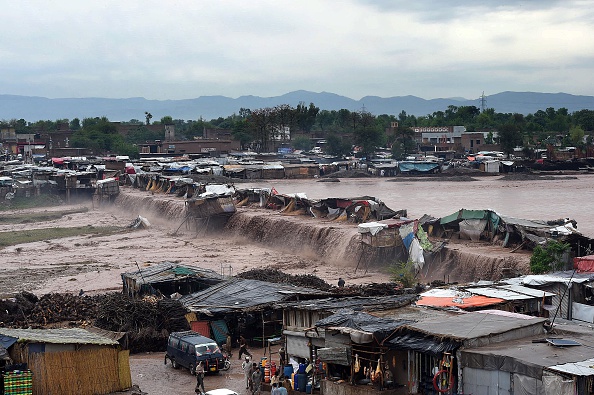
Flood waters rush through a Pakistani market area as vendors and resident scramble to save their possessions on the outskirts of Peshawar on April 3, 2016. Heavy rains have killed at least 121 people, injured 124 and damaged 852 houses since March 9 across Pakistan, according to the National Disaster Management Authority. It said landslides and collapsed roofs caused most of the fatalities. / AFP / A MAJEED (Photo credit should read A MAJEED/AFP/Getty Images)
[blogo-gallery id=”162765″ layout=”photostory”]
Sono almeno 53 le vittime delle inondazioni causate dalle piogge torrenziali che hanno colpito il Pakistan da sabato scorso. Le cifre, confermate da alcuni funzionari locali, si riferiscono alle conseguenze delle inondazioni che hanno colpito le province di Khyber Pakhtunkhwa, Kashmir e Gilgit-Baltistan.
Le piogge pre-monsoniche hanno causato gravi danni nelle zone rurali e si teme per ciò che potrebbe succedere nella fase dei monsoni veri e propri, il periodo dell’anno in cui si registrano le precipitazioni più abbondanti. Nell’agosto 2015 circa 170 persone hanno perso la vita a causa delle alluvioni avvenute in Pakistan.
Oltre ai 53 decessi, decine di persone sono finite in ospedale con ferite. Le autorità hanno detto che sono stati inviati sul posto generi di primo soccorso e tende. Centinaia di persone sono state spostate in zone più sicure.
[blogo-video id=”162766″ title=”Alluvioni in Pakistan” content=”” provider=”askanews” image_url=”http://engine.mperience.net/cdn/static/img/tmnews/20160404_video_11350041.jpg” thumb_maxres=”0″ url=”20160404_video_11350041″ embed=”PGRpdiBpZD0nbXAtdmlkZW9fY29udGVudF9fMTYyNzY2JyBjbGFzcz0nbXAtdmlkZW9fY29udGVudCc+PHNjcmlwdCB0eXBlPSJ0ZXh0L2phdmFzY3JpcHQiIHNyYz0iaHR0cDovL2VuZ2luZS5tcGVyaWVuY2UubmV0L0VuZ2luZVdpZGdldC9zY3JpcHRzL3dpZGdldF8xIj48L3NjcmlwdD48ZGl2IGNsYXNzPSJtcGVfd2lkZ2V0IiBkYXRhLW1wZT0ndHlwZT1wbGF5ZXJ8YXBwSWQ9MTl8dGFyZ2V0SWQ9MjAxNjA0MDRfdmlkZW9fMTEzNTAwNDF8cGxheWVyT3B0aW9ucz17ImF1dG9wbGF5Ijoibm9uZSIsImFkdlVSTCI6Imh0dHA6Ly9vYXMucG9wdWxpc2VuZ2FnZS5jb20vMi92aWRlby5ibG9nby5pdC9hc2thbmV3cy9wbGF5ZXJAeDUwIiwidXNlSW1hU0RLIjp0cnVlfSc+PC9kaXY+PHN0eWxlPiNtcC12aWRlb19jb250ZW50X18xNjI3NjZ7cG9zaXRpb246IHJlbGF0aXZlO3BhZGRpbmctYm90dG9tOiA1Ni4yNSU7aGVpZ2h0OiAwICFpbXBvcnRhbnQ7b3ZlcmZsb3c6IGhpZGRlbjt3aWR0aDogMTAwJSAhaW1wb3J0YW50O30gI21wLXZpZGVvX2NvbnRlbnRfXzE2Mjc2NiAuYnJpZCwgI21wLXZpZGVvX2NvbnRlbnRfXzE2Mjc2NiBpZnJhbWUge3Bvc2l0aW9uOiBhYnNvbHV0ZSAhaW1wb3J0YW50O3RvcDogMCAhaW1wb3J0YW50OyBsZWZ0OiAwICFpbXBvcnRhbnQ7d2lkdGg6IDEwMCUgIWltcG9ydGFudDtoZWlnaHQ6IDEwMCUgIWltcG9ydGFudDt9PC9zdHlsZT48L2Rpdj4=”]
Via | BBC



